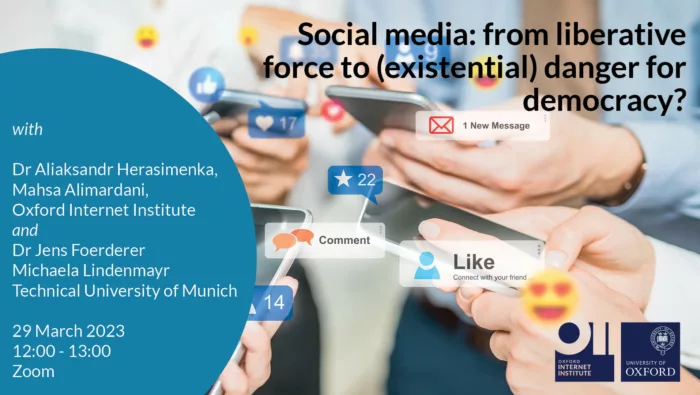
Dr Aliaksandr Herasimenka
Former Postdoctoral Researcher
Aliaksandr is a political communication researcher and was Director of Research at the Programme on Democracy and Technology at the Oxford Internet Institute.

This joint OII and TUM webinar will feature talks from Dr Aliaksandr Herasimenka and Mahsa Alimardani of the OII and Dr Jens Foerderer and Michaela Lindenmayr of TUM.
Dr Aliaksandr Herasimenka presents “Exploring the Dark Side of Technology: Non-Democratic Actors Utilize AI and Social Media to Manipulate Global Politics”. We explore how governments that do not operate democratically, such as Russia and China, use modern technology to control their citizens and pursue their global goals. We will take a closer look at how these governments utilize artificial intelligence and social media in their information campaigns, both at home and on the world stage. We will also examine real-life instances of this technology being used in events like the war in Ukraine, the Covid pandemic, and election campaigns.
Mahsa Alimardani presents “Digital Repression, and how the Islamic Republic of Iran”. The talk will delve into the tactics of digital repression in Iran and how it illustrates what authoritarian internet frameworks mean and what technology needs to empower democracy and civil society.
Dr Jens Foerderer and Michaela Lindenmayr present “Purchased Popularity: Firms’ Motivations and Financial Risks of Fake Follower Use”. For firms, it is crucial to garner attention on social media platforms. Important yet little understood questions in that regard are to what degree firms rely on fake followers, and how investors react when this fraudulent practice becomes apparent. Twitter, over two days in 2018, purged tens of millions of suspicious accounts from the platform. This so-called Great Purge was unexpected and implemented quickly, which allows us to exploit it as a shock. We compile a unique daily panel of follower counts and stock prices of U.S. firms and make the following findings. First, we estimate that firms experience an average decline in followers by 1.2%. This effect is larger the greater the industry competition faced by firms and the smaller the firms. Second, we find that investors react negatively to the information that a firm engaged in follower fraud. If 1% of a firm’s followers are exposed to be fake, cumulative abnormal returns of a firm’s stock price decline by about -0.078%. This suggests that fake followers serve as a signal for influence. Our findings provide reliable estimates of fake follower fraud by firms, motivations to engage in it, and help understand the consequences of fake follower fraud.
This event is supported by the Dieter Schwarz Foundation.

Former Postdoctoral Researcher
Aliaksandr is a political communication researcher and was Director of Research at the Programme on Democracy and Technology at the Oxford Internet Institute.

DPhil Student
Mahsa Alimardani is a DPhil candidate that is completing her research part-time at the OII on information controls and political communication in authoritarian settings, with a specific look at Iran.

Former Visiting Research Fellow
Prof. Jens Foerderer is a Visiting Research Fellow at the Oxford Internet Institute and Professor at the Technical University of Munich, Campus Heilbronn in Germany.

TUMH

Chair for Information Systems, Professor of Information Systems, Head of KrcmarLab at the Faculty of Informatics, Technical University of Munich (TUM), Delegate Officer of the President for the overall development of the TUM Campus Heilbronn
Helmut Krcmar is a German Information Systems and Management scholar. He conducts research in the fields of digital transformation, information and knowledge management, platform-based ecosystems.

Assistant Professor for Information Systems, University of Innsbruck
Maximilian’s research interests include digital platform ecosystems, platform governance, digital transformation of established companies, and digital platforms for social causes.